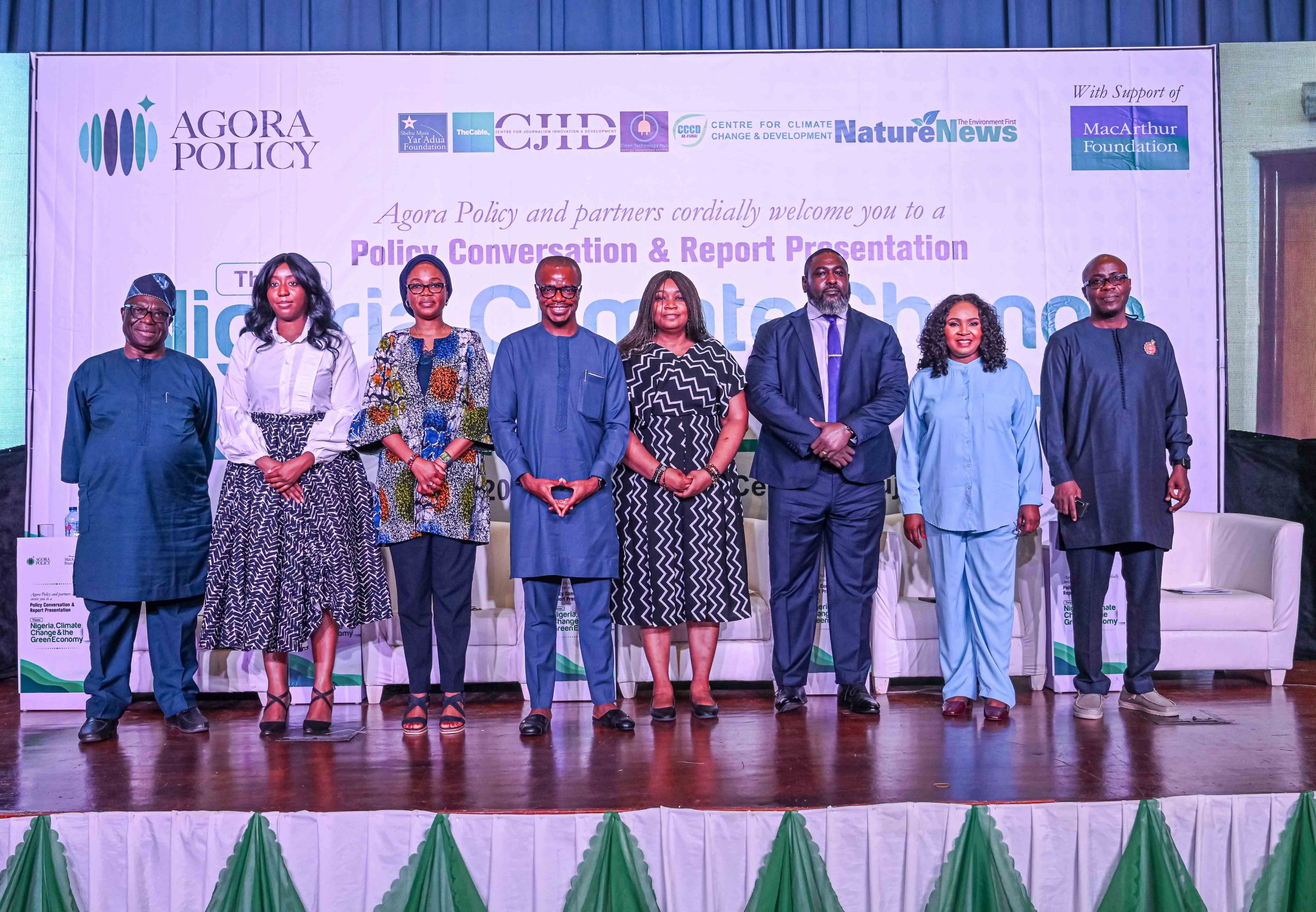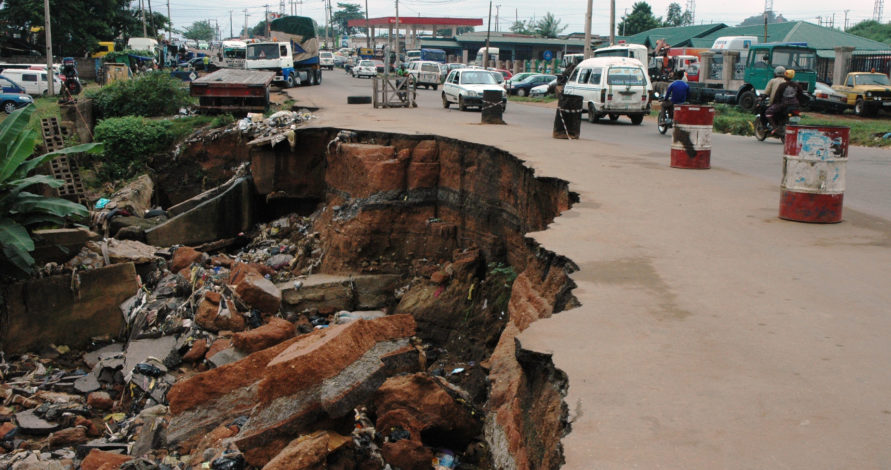By David Nwachukwu
Nigeria is an eerie example of the relationship between climate change and insecurity. Nigeria’s location in both the Sahel region of Africa and along the coastal line of West Africa increasingly makes the country vulnerable to climate shocks from the north and the south. The Lake Chad basin, a major lifeline for millions of people living in the Sahel, has notably shrunk by 90 percent since the 1960s.Drought and desertification have increased in recent years, negatively impacting the arid northern states. Coastal erosion and flooding are now frequently experienced in Lagos, Kogi, Benue and other states, due to high precipitation, among other reasons.
These climate shocks negatively impact not just life and livelihoods but also contribute to struggles and conflicts over arable land and water. The latest report by Agora Policy, ‘Understanding and Tackling Insecurity in Nigeria,’ rightly identifies climate change as a much-overlooked driver of conflict in Africa’s most populous nation.
As world leaders converge in Egypt this month for the 27th United Nations Climate Change Conference (COP27), climate activists can expect a plethora of pledges from each country aimed at tackling the reduction of carbon emissions. For Nigeria to reduce its vulnerability to natural disasters and climate change, government agencies must accelerate their plans for adaptation and mitigation by implementing holistic solutions to climate-related security issues. Doing this well will also assist Nigeria in tackling its security challenges.
It is estimated that in the past 15 years alone, the number of deaths in the Sahel has increased by more than a thousand percent as a result of the competition for the region’s dwindling supplies of water and food. Insurgent groups like Boko Haram seek to take advantage of the fact that 30 million people in Nigeria, Chad, Niger, and Cameroon are all vying for the same limited water resources. Recent ecological threat reports point out how terror groups in charge of water supply can charge an already vulnerable population a fee to use limited supply, using it as leverage to conscript them, or even use their need for water as an excuse to forcibly enlist members.
Young girls and women are disproportionately affected by this while carrying out domestic duties, taking long walks in search of water– often facing the great risk of abduction and sexual assault. Nigeria’s security situation is exacerbated by its porous borders, which allow for unchecked/unsupervised entry into the country, making people in Northern Nigerian communities even more susceptible to attacks.
The harmful effects of climate change pose immense risks to the lives, livelihoods and well-being of communities across West Africa. Despite making the least contributions to the global climate crisis– emitting just 0.51% of total greenhouse gas emissions (GHG) the region remains one of the biggest victims of its ghastly impacts, bearing an unfair burden of the global north’s mistakes.
Socioeconomic Impacts of Climate Insecurity
The massive loss of livelihoods to climate disasters puts even greater pressure on the national economy. Two-thirds of the global poor are reported to be from Sub-Saharan Africa, with Nigeria recording the highest number of poor people living within the region. The World Bank has recently estimated the number of citizens living in poverty will reach 95.1 million by the end of 2022. Climate-related shocks such as the country’s recent flooding crisis have displaced over two million citizens to date, damaging over a million acres of the nation’s farmlands.
By proxy, the impact of these catastrophic floods further escalates an already existing food crisis, as 2022 marks the second consecutive year when Nigeria ranks 103rd on the Global Hunger Index (GHI). Before experiencing the worst deluge in over a decade, rain-fed farming patterns were already changing due to unpredictable weather conditions– making temperatures rise and fall drastically during dry seasons and pushing farm households to adapt their livelihoods to new conditions.
With pastoral communities losing land and water resources to environmental decay, many are forced to become climate migrants in search of sustenance, where they are pushed south towards central farmlands. This shift creates a scuffle for limited resources leading to conflict. The long-standing conflict between farmers and herdsmen has escalated dramatically in the Middle Belt, a central region in Nigeria, as herdsmen have been forced to migrate south from their traditional grazing lands as a result of drought. This pattern is reflected in different parts of the country, including the North West, South West and the South East.
The recent report on insecurity by Agora Policy points out how clashes between farmers and herders over land have spurred the formation of ethnic militias, vigilante raids, and extrajudicial killings across Adamawa, Benue, Taraba, Plateau, Kaduna and other states. According to the report, land available for open grazing in Nigeria’s Middle Belt declined by 38 per cent between 1975 and 2013, while the area dedicated to farming nearly trebled.
Elsewhere, climate migration significantly impacts security in the country’s major urban centres. The massive influx of displaced persons presents a problem in addressing issues of housing, employment and increased pollution. In the absence of available jobs and access to reasonable living conditions, displaced persons often turn to crime, illicit drug use and other scrupulous activities. Those living in peri-urban communities face the threat of being attacked by a vulnerable population that yields to the indoctrination of terrorist/militant groups.
Need for A Multidimensional Nature-Based Approach
It is advisable for policymakers to embrace a multidimensional approach to tackling this crisis. Going beyond the policies for sustainable development within Nigeria’s recently launched 2021 Climate Act, there is also a need for solutions tailored to the issues plaguing hotspots of conflict. The United Nations Environment Programme (UNEP) recommends that countries should enhance their preparedness for identifying, preventing and responding to climate-related security risks.
The report by Agora Policy has a number of recommendations along this line. One of these is a thorough review of Nigeria’s Land Use Act (1978). Review of this law is critical to the resolution of ongoing herder-farmer conflicts that hold resources ransom. Another recommendation is that government-proposed plans such as The National Livestock Transformation Plan (NLTP) and the National Pasture Development Programme (NAPDEP) should be much more transparent and inclusive to better address the concerns and needs of other citizens affected by these issues.
Additionally, enhancing the role of traditional justice mechanisms can also play a great role in managing the agitations brought by land disputes and communal conflicts, which are direct results of the degradation in Northern states brought on by climate change. There are also prospects for the Nigerian economy through climate financing, which would help the country’s mitigation and adaptation efforts in vulnerable sectors like agriculture and the power sector. Given the varied drivers and manifestations of insecurity identified in the report, it is important for policymakers to address root causes like climate change through holistic approaches.
*Nwachukwu is a Communication Officer at Agora Policy




